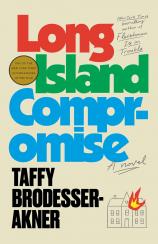Long Island Compromise
Review
Long Island Compromise
Taffy Brodesser-Akner’s second novel, LONG ISLAND COMPROMISE, opens with a heart-pumping series of events.
During March 1980, Carl Fletcher --- a factory owner, a family man (father to two sons and a baby on the way, husband to Ruth, son to Phyllis), and one of the richest men in a certain suburb on Long Island --- is kidnapped on his way to work. He remains missing for several days, with no communication from him or his abductors, until Ruth gets a request for an exorbitant sum. With her toddler son in the backseat, she meets the kidnappers’ demands, at which point Carl is returned. She then discovers that he had been held in the basement of his own Styrofoam factory the entire time.
"Although LONG ISLAND COMPROMISE can be very funny, it’s also a rich reflection on the changing identities of American Jews over the past half-century and a well-crafted dramatization of the idea of inherited trauma."
Soon afterwards, the Fletchers move away from the scene of the crime and into a home on their enormous family compound, baby Jenny is born, and almost no one speaks of those harrowing days again. But everyone notices that Carl hasn’t been himself since the spring of 1980. Even though, by all surface measures, his kids have grown up to be successful and well-adjusted, a glimpse behind the curtain might reveal that all is not quite well with the Fletcher offspring.
Oldest son Nathan has become a lawyer, a land-use attorney (a specialty he backed into because it involves no time in court, very little confrontation, and a lot of research and paperwork). He has a wife and two children of his own, twin boys preparing for their upcoming bar mitzvah --- a landmark event that also has inspired his wife, who grew up in an Orthodox home with very little money, to remodel much of their house.
Secretly, however, Nathan is terrified of risk. He has insurance policies for every kind of risk you can imagine, and probably some you can’t. He spends his days worrying about disasters that might befall his family, and when his sons were younger, he repeatedly and unironically read them a picture book titled Are You Sure You’ve Thought This Through?
Younger brother Bernard (always known as Beamer) and his wife, Noelle, take great delight in reading that same picture book, which ironically their kids received as a gift from their uncle. Their family lives in Los Angeles, where Beamer once enjoyed modest success as a screenwriter for a series of action films that he co-wrote with a childhood friend. But time has passed, that movie franchise is full of offensive content and not aging well, and his much more talented writing partner has moved on to a wildly popular television show (whose characters bear more than a passing resemblance to the Fletchers).
Beamer has tried writing his own material, but every screenplay he pens somehow involves kidnapping, and no one is interested in producing them. So he spends his days alternately stimulating and depressing himself with a volatile cocktail of drugs, alcohol and sex with dominatrixes.
What of Jenny, the youngest Fletcher child, not even born yet when Carl was kidnapped? Jenny would seem to be the most well-adjusted of the bunch. She is likable, high-achieving and appears to have found her niche as a labor organizer. But in the weeks and months surrounding Phyllis’ death and the family’s gathering to observe her funeral, even Jenny starts to suspect --- with a little bit of help --- that perhaps the dybbuk (a troublesome spirit unable to find rest) that her grandparents and parents spoke of at times of trouble and chaos has affected her as well.
Brodesser-Akner, whose debut, FLEISHMAN IS IN TROUBLE, was adapted for the small screen, is also well known for her wonderfully detailed profiles of celebrities for the New York Times Magazine and elsewhere. It’s no wonder that her sophomore effort is full of splendidly idiosyncratic moments and observations, and it feels ripe for adaptation as a television series. The Fletchers are both odious and endlessly surprising, and even at their worst, readers might find elements to root for.
Although LONG ISLAND COMPROMISE can be very funny, it’s also a rich reflection on the changing identities of American Jews over the past half-century and a well-crafted dramatization of the idea of inherited trauma. Furthermore, it’s a portrait of a specific kind of place, a Long Island community that has the distinction of being one of the first areas in the United States to have a Jewish majority. Its narrator (who occasionally lapses into the first-person plural “we”) seems to be other Jews who grew up there, perhaps without the Fletcher family’s impressive wealth --- or their spectacular fall from grace and dubious rise again.
Reviewed by Norah Piehl on July 23, 2024
Long Island Compromise
- Publication Date: May 20, 2025
- Genres: Fiction
- Paperback: 464 pages
- Publisher: Random House Trade Paperbacks
- ISBN-10: 059313351X
- ISBN-13: 9780593133514




